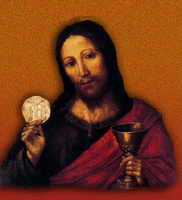The Nature and Blessings of Holy Communion
Q: My confirmation class needs to note differences between Reformed, Roman Catholic, and Lutheran teaching regarding the Lord’s Supper. These involve 1) the church; 2) the elements offered; 3) what is received by the communicant after the Words of Institution; 4) what this is called; and 5) who benefits. Can you please help me with this?
 A: It’s a little easier to summarize Roman Catholic and Lutheran teachings since, within their respective confessions, both Lutherans and Catholics tend to clearly state their teachings and just as clearly reject contradictory doctrines. Of course, each individual Lutheran or Catholic lay person or clergyman (or “clergyperson” in more liberal Lutheranism) may not agree with every accepted doctrine. However, the Catholic Church and those parts of the Lutheran Church that remain Lutheran in belief as well as name each has only one officially accepted set of teachings regarding Communion.
A: It’s a little easier to summarize Roman Catholic and Lutheran teachings since, within their respective confessions, both Lutherans and Catholics tend to clearly state their teachings and just as clearly reject contradictory doctrines. Of course, each individual Lutheran or Catholic lay person or clergyman (or “clergyperson” in more liberal Lutheranism) may not agree with every accepted doctrine. However, the Catholic Church and those parts of the Lutheran Church that remain Lutheran in belief as well as name each has only one officially accepted set of teachings regarding Communion.The waters get murkier once we move to the Reformed and other branches of Protestantism. Early founders Ulrich Zwingli and John Calvin disagreed and their differences persist among the later Protestants. Some of the more liberal Reformed churches go so far as to allow each individual’s understanding of the Supper stand because these bodies hold very generic, inclusive teachings concerning its nature and efficacy. In other words, these bodies let you believe whatever you want and won’t challenge your beliefs because to do so might seem meanspirited or unloving. Meanwhile, the more conservative branches cling to their official confessions, many of which were formed, refined, and codified around the same time that the Lutherans were making their own Reformation confessions.
In general, the Roman Church teaches that it alone is the One True Church. Officially, Rome never surrendered the claim that there is no salvation outside the Christian Church (something that we Lutherans and many other Christians hold in agreement). However, Catholicism goes on to question, even deny, the existence of true Christianity outside of Rome. While Pope John Paul II publicly retreated from the extremes of this dogma, Benedict XVI clearly believes it and urges Catholics to teach it in church, home, and school. This means that Rome can say that the only certain celebrations of the Supper happen within Catholicism.
In contrast to the clear confessions of Lutheranism and Catholicism, we cannot point out one absolute teaching that all the Reformed hold in common. Generally, however, most Reformed churches consider a Communion service held within any Christian body to be equally valid with any other Christian service. It’s easier for them to do so than it is for staunch Lutherans and Catholics, since we both disagree with Reformed teachings about the elements used and received and about the benefits (and liabilities) of communing.
Lutherans generally teach that if a church confesses the faith of the Creeds and uses the elements first blessed by Christ, the meal is truly the Lord’s Supper, even if most of those communing don’t hold the same beliefs about what they receive.
I suggest that we classify the “elements” into two parts — those pre-consecration and those offered and received. At one time, all of Christendom brought the same two elements to the table, namely bread and wine. Along with the various Orthodox bodies (a group not included in your assignment), Catholics and Lutheran still officially continue this practice. Meanwhile, much (most?) of Protestantism uses some sort of bread while replacing wine with grape juice or other liquids.
 Following the Words of Christ (a.k.a. the Words of Institution, the Verba, or the Consecration), we find even greater disagreement. Rome officially teaches that in a miraculous way, the bread and wine are replaced by the very body and blood of Christ. Even though they keep their outward appearances, flavors, and consistencies, the original elements are gone. The official word for this action is Transubstantiation.
Following the Words of Christ (a.k.a. the Words of Institution, the Verba, or the Consecration), we find even greater disagreement. Rome officially teaches that in a miraculous way, the bread and wine are replaced by the very body and blood of Christ. Even though they keep their outward appearances, flavors, and consistencies, the original elements are gone. The official word for this action is Transubstantiation.Protestantism has two general schools, generally following either Calvin or Zwingli. Calvin preferred to speak of a mystical presence of Christ. Of all the teachings, this is probably the most complex and involved but a thumbnail is that bread and wine are the “vehicles” by which the spirit of Christ (usually not believed to be the Holy Spirit) enters each communicant. Most Calvinists restrict this mystical presence to communing believers, stating that if unbelievers and impenitents eat and drink, they only receive bread and wine.
The Zwinglian view is much more common among today’s Protestants. For them, the presence of Christ is the same in the Supper as anywhere else, so He’s there in spirit in the same way as He’s with us at home or on the road. Indeed, because logic dictates that a human body cannot be in more than one place at a time, they deny any bodily presence of Jesus that’s away from “the right hand of God. (Acts 2:33, et al.)” For them, Communion is strictly a memorial meal. The gift of Jesus’ body and blood is almost completely ignored in favor of Jesus’ other words, “in remembrance of me. (1 Corinthians 11:25)”
Sometimes incorrectly called Consubstantiation, the official Lutheran teaching is that we receive all four elements, bread, wine, body, and blood. Luther and his followers never tried to explain this, accepting this Real Presence of Christ (our preferred term) by faith, as they also did the nature of a Triune God or such miracles as Christ’s incarnation, virgin birth, and resurrection.
 Luther’s logical nature rebelled against such a thing but faith in Jesus’ words made it a certainty for him. Upon hearing Luther mention the wine we drink, the Zwinglians pressured him to abandon any teaching that the communicants also receive Christ’s blood. Luther instead said, “It is enough for me that Christ’s blood is present; let it be with the wine as God wills. Sooner than have mere wine with the fanatics, I would agree with the pope that there is only blood.”
Luther’s logical nature rebelled against such a thing but faith in Jesus’ words made it a certainty for him. Upon hearing Luther mention the wine we drink, the Zwinglians pressured him to abandon any teaching that the communicants also receive Christ’s blood. Luther instead said, “It is enough for me that Christ’s blood is present; let it be with the wine as God wills. Sooner than have mere wine with the fanatics, I would agree with the pope that there is only blood.”Some later Lutherans claimed that the miracle of the Real Presence isn’t complete until the communicant takes and eats and drinks. This is called Receptionism, and is generally repudiated by the Lutheran Church, since we teach that the Word of Christ, not human action determines what we receive.
I’m not sure what “this” your fourth point involves. I’ve already mentioned the professed categories of Reformed (memorial meal), Catholic (Transubstantiation), and Lutheran (Real Presence). Regarding the entire meal — even the entire service — Catholics often speak of the Mass and, along with many other Christians, also talk of the Eucharist (thanksgiving). Lutherans usually use Communion, Holy Communion, or Lord’s Supper as preferred terms, calling the entire worship the Divine Service.
Finally, in one way or another, all these bodies generally agree that true benefits only accrue to true believers. However, the warnings about sinning against the body and blood of the Lord (see 1 Corinthians 11:17-34) are generally treated much more seriously in Lutheranism and Catholicism than among the Reformed churches. After all, if you’re not really receiving the body and the blood, how do you make yourself guilty of them? And if you only receive if you believe, what would be the big worry, anyhow?
Scripture quoted from The Holy Bible, English Standard Version™, © 2001 by Crossway Bibles.
Send email to Ask the Pastor.
Walter Snyder is the pastor of Holy Cross Lutheran Church, Emma, Missouri and coauthor of the book What Do Lutherans Believe.
Technorati Tags: Holy Communion | Lord’s Supper | Communion | Eucharist | Divine Service | Mass | wine | bread | body | blood | Real Presence | Transubstantiation | Martin Luther | Luther | Calvin | John Calvin | Ulrich Zwingli | Huldrych Zwingli | Zwingli | Roman Catholic Church | Catholic Church | Catholicism | Protestantism | Protestant | Reformed | Zwinglian | Calvinist | Lutheran | confessional Lutheran | Lutheranism | Christian | Christianity | theology | systematic theology | dogmatics | sacramental theology | exegetical theology | exegesis | practical theology | Pastor Walter P. Snyder | Walter Snyder | Ask the Pastor
Newspaper column #540

0 Comments:
Post a Comment
<< Home